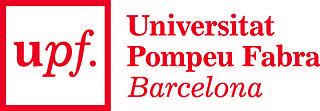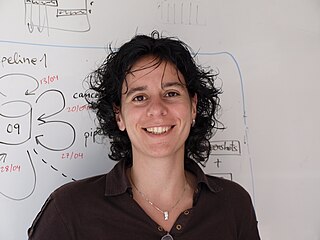
The Institute for Catalan Studies, also known by the acronym IEC, is an academic institution which seeks to undertake research and study into "all elements of Catalan culture". It is based in Barcelona, Spain.

Pompeu Fabra University is a public university located in the city of Barcelona, Catalonia in Spain. The university was created by the Autonomous Government of Catalonia in 1990, and was named after Pompeu Fabra, a Catalan engineer, grammarian and the main author of the normative reform of contemporary Catalan language. In 2021, UPF was ranked the best university in Spain and 10th best young university in the world by the Times Higher Education World University Rankings.
The Spanish National Bioinformatics Institute is an academic service institution tasked with the coordination, integration and development of bioinformatics resources in Spain. Created in 2003, the INB is—since 2015—the main node through which the Carlos III Health Institute is connected to ELIXIR, a European-wide infrastructure of life science data, coordinating the other Spanish institutions partaking in the initiative such as the Spanish National Cancer Research Centre (CNIO), the Centre for Genomic Regulation (CRG), the Universitat Pompeu Fabra, the Institute for Research in Biomedicine (IRB) and the Barcelona's National Supercomputing Center.
The Pennington Biomedical Research Center is a health science-focused research center in Baton Rouge, Louisiana. It is part of the Louisiana State University System and conducts clinical, basic, and population science research. It is the largest academically-based nutrition research center in the world, with the greatest number of obesity researchers on faculty. The center's over 500 employees occupy several buildings on the 222-acre (0.90 km2) campus. The center was designed by the Baton Rouge architect John Desmond.

The Barcelona School of Economics (BSE) is an institution for research and graduate education in economics, finance, data science, and the social sciences located in Barcelona, Spain.
Jordi Camí is Professor of Pharmacology at Pompeu Fabra University, General Director of the Barcelona Biomedical Research Park (PRBB), and Vicepresident of the Pasqual Maragall Foundation.
Miquel Porta is a Catalan physician, epidemiologist and scholar. He has promoted the integration of biological, clinical and environmental knowledge and methods in health research and teaching, which he has conducted internationally; notably, in Spain, at the University of North Carolina at Chapel Hill, Harvard, Imperial College London, and several other universities in Europe, North America, Kuwait, and Brazil. Appointed by the International Epidemiological Association (IEA), in 2008 he succeeded the Canadian epidemiologist John M. Last as Editor of "A Dictionary of Epidemiology". In the Preface to this book he argues for an inclusive and integrative practice of the science of epidemiology.

Albert Marcet Torrens is a Spanish economist, specialized in macroeconomics, time series, financial economics and economic dynamic theory. He is currently serving as Professor of Macroeconomics at the UCL Department of Economics, on leave from his position as ICREA Research Professor and Director of the Institute for Economic Analysis (IAE), a research centre of the Spanish National Research Council (CSIC), and AXA Research Chair on Macroeconomic Risk at the Barcelona Graduate School of Economics. He is also a Fellow of the Econometric Society and he has been a Research Fellow of Centre for Economic Policy Research (CEPR) since 1992.

Xavier Serra is a researcher in the field of Sound and Music Computing and professor at the Pompeu Fabra University (UPF) in Barcelona. He is the founder and director of the Music Technology Group at the UPF.
The National Center for Genomic Analysis is a genome analysis center in Barcelona that carries out large-scale projects in collaboration with researchers from Catalonia, Spain and the International research community. It has a park of 13 last-generation sequencing systems supported by an outstanding computing infrastructure of 2.6 petabytes of data storage and over 1200 cores of computing, which has enabled the center to build a sequencing capacity of over 800 Gbases/day, the equivalent of completely sequencing eight human genomes every 24 hours. This capacity positions the CNAG as one of the top European centers in terms of sequencing capacity.

The Institut Barcelona d'Estudis Internacionals (IBEI) is an interuniversity research institute and postgraduate education center located in Barcelona, established in 2004 as a joint initiative between the Barcelona Centre for International Affairs and five universities in the Barcelona metropolitan area, as a center of excellence in international studies. The President of the Institute is Narcís Serra, former Minister of Defense and former Vice President of Spain, and the Director is Jacint Jordana, Professor of Political Science at the Pompeu Fabra University.
Latvian Biomedical Research and Study Centre (LBMC) is the scientific institute in molecular biology and biomedicine in Latvia. Since its establishment in 1993 it has evolved into a scientific centre performing basic as well as applied research in molecular genetics, vaccine development, genomics and proteomics, cancer biology, immunology, biotechnology, stem cell biology, structure biology and other scientific areas.
The Centre for Genomic Regulation is a biomedical and genomics research centre based on Barcelona. Most of its facilities and laboratories are located in the Barcelona Biomedical Research Park, in front of Somorrostro beach.

Núria López Bigas is a Spanish biologist and research professor with expertise in medical genetics, computational biology, and bioinformatics. She is an ICREA professor at Pompeu Fabra University and she also leads the Biomedical Genomics Research Group at the Institute for Research in Biomedicine in Barcelona, Spain. Her research is focused on developing computational approaches to investigate cancer genomes.

Centres de Recerca de Catalunya is the corporative denomination of a group of centers of excellence based in Catalonia, Spain, called CERCA Centers, and the institution that coordinates them, called CERCA or I-CERCA.

Carles Lalueza Fox is a Spanish biologist specialized in the study of ancient DNA. A doctor in Biology for the University of Barcelona, he worked in Cambridge and Oxford as well as in the private genetics company CODE Genetics of Iceland. Since 2008, he has served as a research Scientist in the Institute of Evolutionary Biology.
Keith A. Crandall is an American computational biologist, bioinformaticist, and population geneticist, at George Washington University, where he is the founding director of the Computational Biology Institute, and professor in the Department of Biostatistics and Bioinformatics.
The UPF-Centre for Animal Ethics (UPF-CAE) is an animal advocacy think tank based at Pompeu Fabra University. It aims to disseminate and promote non-anthropocentric and non-speciesist ethical perspectives in academia, politics and the media. The centre was established in December 2015 and is the first centre of its kind in both Catalonia and Spain. Its main activities include the co-organization of the 6th Conference of the European Association for Critical Animal Studies, together with the European Association for Critical Animal Studies. The centre's Media Observatory of Speciesism was launched in 2018, it analyzes the treatment of animals in the media from an anti-speciesist perspective and makes recommendations for ending speciesism in the media.
Catia Faria is a Portuguese moral philosopher and activist for animal rights and feminism. She is assistant professor in Applied Ethics at the Complutense University of Madrid, and is a board member of the UPF-Centre for Animal Ethics. Faria specialises in normative and applied ethics, especially focusing on how they apply to the moral consideration of non-human animals. In 2022, she is expected to publish her first book Animal Ethics in the Wild: Wild Animal Suffering and Intervention in Nature.

The Institute of Evolutionary Biology (IBE) is a joint research center of Pompeu Fabra University (UPF) and the Spanish National Research Council (CSIC) founded in 2008. IBE is the only research center in Catalonia and the rest of Spain that is entirely dedicated to evolutionary biology.










